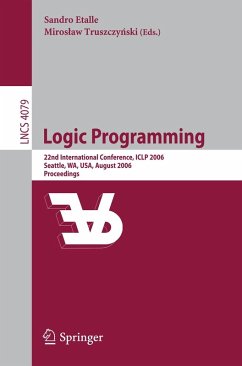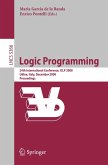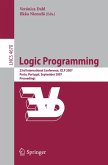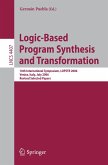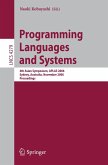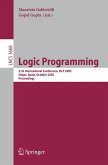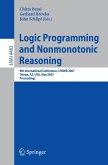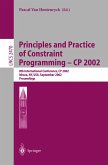Logic Programming (eBook, PDF)
22nd International Conference, ICLP 2006, Seattle, WA, USA, August 17-20, 2006, Proceedings
Redaktion: Etalle, Sandro; Truszczynski, Miroslav
40,95 €
40,95 €
inkl. MwSt.
Sofort per Download lieferbar

20 °P sammeln
40,95 €
Als Download kaufen

40,95 €
inkl. MwSt.
Sofort per Download lieferbar

20 °P sammeln
Jetzt verschenken
Alle Infos zum eBook verschenken
40,95 €
inkl. MwSt.
Sofort per Download lieferbar
Alle Infos zum eBook verschenken

20 °P sammeln
Logic Programming (eBook, PDF)
22nd International Conference, ICLP 2006, Seattle, WA, USA, August 17-20, 2006, Proceedings
Redaktion: Etalle, Sandro; Truszczynski, Miroslav
- Format: PDF
- Merkliste
- Auf die Merkliste
- Bewerten Bewerten
- Teilen
- Produkt teilen
- Produkterinnerung
- Produkterinnerung

Bitte loggen Sie sich zunächst in Ihr Kundenkonto ein oder registrieren Sie sich bei
bücher.de, um das eBook-Abo tolino select nutzen zu können.
Hier können Sie sich einloggen
Hier können Sie sich einloggen
Sie sind bereits eingeloggt. Klicken Sie auf 2. tolino select Abo, um fortzufahren.

Bitte loggen Sie sich zunächst in Ihr Kundenkonto ein oder registrieren Sie sich bei bücher.de, um das eBook-Abo tolino select nutzen zu können.
This book constitutes the refereed proceedings of the 22nd International Conference on Logic Programming, ICLP 2006, held in Seattle, WA, USA, in August 2006. This volume presents 20 revised full papers and 6 application papers together with 2 invited talks, 2 tutorials and special interest papers, as well as 17 poster presentations and the abstracts of 7 doctoral consortium articles. Coverage includes all issues of current research in logic programming.
- Geräte: PC
- ohne Kopierschutz
- eBook Hilfe
- Größe: 5.06MB
Andere Kunden interessierten sich auch für
![Logic Programming (eBook, PDF) Logic Programming (eBook, PDF)]() Logic Programming (eBook, PDF)72,95 €
Logic Programming (eBook, PDF)72,95 €![Logic Programming (eBook, PDF) Logic Programming (eBook, PDF)]() Logic Programming (eBook, PDF)40,95 €
Logic Programming (eBook, PDF)40,95 €![Logic-Based Program Synthesis and Transformation (eBook, PDF) Logic-Based Program Synthesis and Transformation (eBook, PDF)]() Logic-Based Program Synthesis and Transformation (eBook, PDF)40,95 €
Logic-Based Program Synthesis and Transformation (eBook, PDF)40,95 €![Programming Languages and Systems (eBook, PDF) Programming Languages and Systems (eBook, PDF)]() Programming Languages and Systems (eBook, PDF)40,95 €
Programming Languages and Systems (eBook, PDF)40,95 €![Logic Programming (eBook, PDF) Logic Programming (eBook, PDF)]() Logic Programming (eBook, PDF)40,95 €
Logic Programming (eBook, PDF)40,95 €![Logic Programming and Nonmonotonic Reasoning (eBook, PDF) Logic Programming and Nonmonotonic Reasoning (eBook, PDF)]() Logic Programming and Nonmonotonic Reasoning (eBook, PDF)40,95 €
Logic Programming and Nonmonotonic Reasoning (eBook, PDF)40,95 €![Principles and Practice of Constraint Programming - CP 2002 (eBook, PDF) Principles and Practice of Constraint Programming - CP 2002 (eBook, PDF)]() Principles and Practice of Constraint Programming - CP 2002 (eBook, PDF)72,95 €
Principles and Practice of Constraint Programming - CP 2002 (eBook, PDF)72,95 €-
-
-
This book constitutes the refereed proceedings of the 22nd International Conference on Logic Programming, ICLP 2006, held in Seattle, WA, USA, in August 2006. This volume presents 20 revised full papers and 6 application papers together with 2 invited talks, 2 tutorials and special interest papers, as well as 17 poster presentations and the abstracts of 7 doctoral consortium articles. Coverage includes all issues of current research in logic programming.
Dieser Download kann aus rechtlichen Gründen nur mit Rechnungsadresse in A, B, BG, CY, CZ, D, DK, EW, E, FIN, F, GR, HR, H, IRL, I, LT, L, LR, M, NL, PL, P, R, S, SLO, SK ausgeliefert werden.
Produktdetails
- Produktdetails
- Verlag: Springer Berlin Heidelberg
- Seitenzahl: 474
- Erscheinungstermin: 8. August 2006
- Englisch
- ISBN-13: 9783540366362
- Artikelnr.: 43885883
- Verlag: Springer Berlin Heidelberg
- Seitenzahl: 474
- Erscheinungstermin: 8. August 2006
- Englisch
- ISBN-13: 9783540366362
- Artikelnr.: 43885883
- Herstellerkennzeichnung Die Herstellerinformationen sind derzeit nicht verfügbar.
Invited Talks.- Why Use Datalog to Analyze Programs?.- Semantic Web: The Story of the RIFt so Far.- Invited Tutorial.- Overcoming Performance Barriers: Efficient Verification Techniques for Logical Frameworks.- Regular Talks Theory.- Tableau Calculi for Answer Set Programming.- Declarative Semantics of Production Rules for Integrity Maintenance.- Modules for Prolog Revisited.- A Local Algorithm for Incremental Evaluation of Tabled Logic Programs.- Functional and Constraint Logic Programming.- Memory Reuse for CHR.- Overlapping Rules and Logic Variables in Functional Logic Programs.- Towards "Propagation = Logic + Control".- ACD Term Rewriting.- Program Analysis.- Detecting Determinacy in Prolog Programs.- Collapsing Closures.- Reduced Certificates for Abstraction-Carrying Code.- Proving Properties of Constraint Logic Programs by Eliminating Existential Variables.- Answer-Set Programming.- Justifications for Logic Programs Under Answer Set Semantics.- Generality Relations in Answer Set Programming.- Cooperating Answer Set Programming.- Predicate Introduction Under Stable and Well-Founded Semantics.- Special Interest Paper.- Improving the ISO Prolog Standard by Analyzing Compliance Test Results.- Applications I.- TOAST: Applying Answer Set Programming to Superoptimisation.- Modelling Biological Networks by Action Languages Via Answer Set Programming.- Using Answer Set Programming for the Automatic Compilation of Assessment Tests.- Semantics.- Compositional Semantics for the Procedural Interpretation of Logic.- Coinductive Logic Programming.- Analysing and Extending Well-Founded and Partial Stable Semantics Using Partial Equilibrium Logic.- The Semantics of Nominal Logic Programs.- Applications II.- Macros, Macro Calls and Use of Ensembles in Modular Answer SetProgramming.- Deductive Spreadsheets Using Tabled Logic Programming.- Using a Logic Programming Framework to Control Database Query Dialogues in Natural Language.- Poster Presentations.- Declarative Diagnosis of Wrong Answers in Constraint Functional-Logic Programming.- Solving First-Order Constraints in the Theory of the Evaluated Trees.- Relaxation on Optimization Predicates.- Handling Incomplete and Complete Tables in Tabled Logic Programs.- An External Module for Implementing Linear Tabling in Prolog.- Using Combined Static Analysis and Profiling for Logic Program Execution Time Estimation.- Towards Region-Based Memory Management for Mercury Programs.- Towards Structured Contexts and Modules.- Towards Temporal Contextual Logic Programming.- Semantic Property Grammars for Knowledge Extraction from Biomedical Text.- Natural Language Processing Using Lexical and Logical Combinators.- Learning Semantic Parsers: A Constraint Handling Rule Approach.- A Declarative Framework for Security: Secure Concurrent Constraint Programming.- Logic Programming in Knowledge Domains.- Logtalk Processing of STEP Part 21 Files.- Integrating Datalog with OWL: Exploring the AL-log Approach.- LMNtal as a Unifying Declarative Language: Live Demonstration.- Doctoral Consortium Presentations.- Declarative Problem Solving Using Answer Set Semantics.- The Design and Implementation of the YAP Compiler: An Optimizing Compiler for Logic Programming Languages.- Description Logic Reasoning in Prolog.- Static Memory Management for Logic Programming Languages.- Deductive Databases: Implementation, Parallelism and Applications.- Efficient Reasoning About Action and Change in the Presence of Incomplete Information and Its Application in Planning.- Deducing Logic Programs.
Invited Talks.- Why Use Datalog to Analyze Programs?.- Semantic Web: The Story of the RIFt so Far.- Invited Tutorial.- Overcoming Performance Barriers: Efficient Verification Techniques for Logical Frameworks.- Regular Talks Theory.- Tableau Calculi for Answer Set Programming.- Declarative Semantics of Production Rules for Integrity Maintenance.- Modules for Prolog Revisited.- A Local Algorithm for Incremental Evaluation of Tabled Logic Programs.- Functional and Constraint Logic Programming.- Memory Reuse for CHR.- Overlapping Rules and Logic Variables in Functional Logic Programs.- Towards "Propagation = Logic + Control".- ACD Term Rewriting.- Program Analysis.- Detecting Determinacy in Prolog Programs.- Collapsing Closures.- Reduced Certificates for Abstraction-Carrying Code.- Proving Properties of Constraint Logic Programs by Eliminating Existential Variables.- Answer-Set Programming.- Justifications for Logic Programs Under Answer Set Semantics.- Generality Relations in Answer Set Programming.- Cooperating Answer Set Programming.- Predicate Introduction Under Stable and Well-Founded Semantics.- Special Interest Paper.- Improving the ISO Prolog Standard by Analyzing Compliance Test Results.- Applications I.- TOAST: Applying Answer Set Programming to Superoptimisation.- Modelling Biological Networks by Action Languages Via Answer Set Programming.- Using Answer Set Programming for the Automatic Compilation of Assessment Tests.- Semantics.- Compositional Semantics for the Procedural Interpretation of Logic.- Coinductive Logic Programming.- Analysing and Extending Well-Founded and Partial Stable Semantics Using Partial Equilibrium Logic.- The Semantics of Nominal Logic Programs.- Applications II.- Macros, Macro Calls and Use of Ensembles in Modular Answer SetProgramming.- Deductive Spreadsheets Using Tabled Logic Programming.- Using a Logic Programming Framework to Control Database Query Dialogues in Natural Language.- Poster Presentations.- Declarative Diagnosis of Wrong Answers in Constraint Functional-Logic Programming.- Solving First-Order Constraints in the Theory of the Evaluated Trees.- Relaxation on Optimization Predicates.- Handling Incomplete and Complete Tables in Tabled Logic Programs.- An External Module for Implementing Linear Tabling in Prolog.- Using Combined Static Analysis and Profiling for Logic Program Execution Time Estimation.- Towards Region-Based Memory Management for Mercury Programs.- Towards Structured Contexts and Modules.- Towards Temporal Contextual Logic Programming.- Semantic Property Grammars for Knowledge Extraction from Biomedical Text.- Natural Language Processing Using Lexical and Logical Combinators.- Learning Semantic Parsers: A Constraint Handling Rule Approach.- A Declarative Framework for Security: Secure Concurrent Constraint Programming.- Logic Programming in Knowledge Domains.- Logtalk Processing of STEP Part 21 Files.- Integrating Datalog with OWL: Exploring the AL-log Approach.- LMNtal as a Unifying Declarative Language: Live Demonstration.- Doctoral Consortium Presentations.- Declarative Problem Solving Using Answer Set Semantics.- The Design and Implementation of the YAP Compiler: An Optimizing Compiler for Logic Programming Languages.- Description Logic Reasoning in Prolog.- Static Memory Management for Logic Programming Languages.- Deductive Databases: Implementation, Parallelism and Applications.- Efficient Reasoning About Action and Change in the Presence of Incomplete Information and Its Application in Planning.- Deducing Logic Programs.
